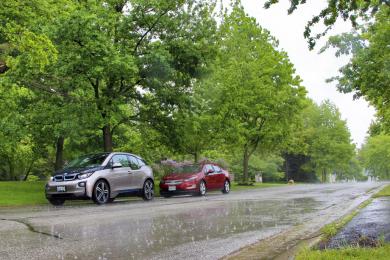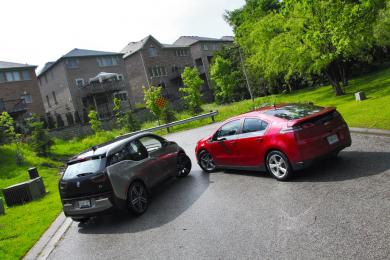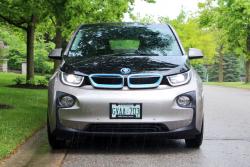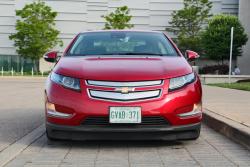  2014 BMW i3 vs Chevrolet Volt. Click image to enlarge |
Performance/Value
Driving the i3 back to back against the Volt, the i3 certainly seems more athletic of the two, but also considerably less comfortable. Piloting the i3 in the city feeling like driving a manual transmission car in second gear, a product of the i3’s strong brake regeneration programming that dramatically slows the car even with a lightening of pressure on the accelerator. In the Leaf and the Tesla Model S, there’s a way to switch how aggressively this regeneration slows the car, but unfortunately, not on the i3.
Some folks prefer this one-foot style of driving, with owners saying it becomes a smoother ride after your right foot becomes used to making minute changes. Must take longer than a half day, as even with careful modulation, there were still a few overly sudden throttle lift “braking” that had my passenger’s head bopping around like I was a nervous newbie manual driver. The regen lessens on the highway, and with the high level of regen, the brake lights actually come on in the city, even if you don’t touch the brakes.
  2014 BMW i3, 2014 Chevrolet Volt. Click image to enlarge |
Straight-line performance is certainly in the i3’s favour, with the BEV version taking 7.2 seconds in the 0-100 km/h dash, about half a second faster than the heavier i3 REx model, with both of them much fleeter than the Volt’s official 9.2 seconds.
Power-wise, the i3 rings in at 170 hp and 184 lb-ft of torque, while the Volt counters with 149 hp and a healthy 273 lb-ft of torque, the latter most apparent when the Volt is in its most energetic Sport mode. Still, the much lighter i3 weights between 1,300 and 1,420 kg, and feels much more energetic than the softer launching and braking Volt.
Despite the marketing behind the Chevrolet and BMW badges, the Volt is a relative sea of luxurious smoothness in both its ride and handling compared to the i3. The BMW’s taller body stays impressively flat in transitions, and cornering grip is surprisingly good considering its super-skinny 155 mm-wide tires, though the ride feels choppier than the Volt. The Volt is far from the ideal long-distance mile muncher, its seats and more cramped-feeling interior betraying it over long hauls, but with the Chevy’s lower price, smoother city comportment, larger gas tank and still responsive Sport mode, its overall usability and value help it nip ahead of the i3’s higher driving fun factor.
Conclusion
Though any BMW versus Chevrolet comparison test is rare, and may seem just plain wrong to some onlookers and both companies themselves, the reality is that the all-new BMW i3’s combination of futuristic looks, interior luxury and athletic driving persona offers a vastly different offering to the Volt. Tight i3 supply will likely limit its sales challenge to the Volt in its first year, but once it offers buyers a less imposing regen setting especially, it just may pose the strongest challenge to the Volt’s Canadian plug-in sales title yet.
Pricing: 2014 BMW i3
Base price: $44,950
Options: Range extender $4,000 (adds two-cylinder engine), Suite Interior package $4,600, Technology Package $2,500, DC SAE Combo fast charging $750
Freight: $2,690
A/C tax: $100
Price (fully loaded): $59,618 (before ON and QC government incentives of $8,500 and $8,000, respectively)
Pricing: 2014 Chevrolet Volt
Base price: $36,895
Options: Crystal Red paint $565, Premium package $1,210, Bullfrog renewable Power $198, Cargo Net $65, Bose 7-Speaker Audio $685, MyLink infotainment w/Navigation $995
Freight: $1,600
A/C tax: $100
Price (fully loaded): $43,008 (before ON and QC government incentives of $8,231 and $8,000, respectively)
Crash Test Results:
National Highway Traffic Safety Administration (NHTSA)
Insurance Institute for Highway Safety (IIHS)











